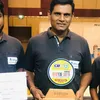From an Indian-origin professor developing 3D-printed living skin to a Mumbai startup cleaning oil spills - top social stories this week
While couple Prashant Lingam and Aruna Kappagantula are promoting an eco-friendly lifestyle by building public amenities using plastic waste, cop Dharamveer Jakhar from Rajasthan’s Churu district has started a free school, Apni Pathshala, for underprivileged children.
Preserving humanity in the age of technological advancement is the need of the hour. More people need to start opening up their eyes and hearts to help one another and society at large.
Police officer Dharamveer Jakhar is doing just that, by helping underprivileged children in Rajasthan’s Churu district. He has made them see the importance of schooling and education as opposed to begging on the streets and built a free school to provide for them and change their focus in life.
Meanwhile, couple Prashant Lingam and Aruna Kappangantula from Hyderabad are informing people about the benefits of building bamboo houses and adopting a sustainable lifestyle.
This week, SocialStory showcases the stories of inspiring individuals who are putting their best foot forward for the cause of humanity.
Meet Manish Gurwani, a ‘small-town lad’ who has become an IAS officer with an all-India rank of 18
Manish Gurwani, 27, was just like any other lad when he was at school and college, eyes brimming with enthusiasm and heart overflowing with passion. However, an aspect that set him apart was his conviction to contribute to the welfare of the society.
Manish had faced many challenges along the way, including his mother’s ill health and the fact that he had to learn English from scratch because he had no choice but to study in a Hindi- speaking school until Class X. Through all that, he never gave up on his dreams.

IAS Officer Manish Gurwani
Manish told SocialStory,
“Just like any other IAS aspirant, I worked really hard. I used to study for six hours every day, and then gradually scaled it up to 10. But the only thing that kept me going through all my rough patches was the faith I had in myself.”
Meet the Rajasthan cop who built a school to educate 450 children who used to beg on the streets
Aware that education is one of the key ways to uplift India’s poor and underprivileged, a cop from Rajasthan is helping children in his neighbourhood get a headstart. Hailing from Rajasthan’s Churu district, Dharamveer Jakhar has started a free school, ‘Apni Pathshala’, for underprivileged children in the area.
Launched on January 1, 2016, the school, located near the women’s police station at the district headquarters, now educates 450 children who earlier used to beg on the streets.
The school currently offers classes from I to VII. As many as 360 students are in the lower classes, while 90 students are studying in classes VI and VII.
The school provides free supplies, including uniforms, books, and bags to its students.

Dharamveer Jakhar (Image: New Indian Express)
Neck-deep in debt once, this Hyderabad couple shows the way to sustainable living with bamboo houses
Founded by Hyderabad couple Prashant Lingam and Aruna Kappagantula, Bamboo House India aims to promote sustainable living.
From building eco-friendly homes of bamboo to footpaths from recycled plastic waste, the couple is also employing several farmers and artisans involved in the process.
Speaking to The News Minute on the initiative, Prashant said,
“In 2018, we built an office for a park at Kukatpally, which was made from half plastic and half bamboo. We even managed to get plastic flooring for the structure. Later, in Miyapur, we built a house for the Metro staff at the parking counter, where the entire structure was made of plastic, except the flooring. Though our ideas are catching up, many remain sceptical about the longevity of such houses.”

Bamboo House (Image:Efforts For Good)
For now, Bamboo House India is focusing on Andhra Pradesh, Telangana, and Tamil Nadu. Their work can be seen at the US Consulate in Hyderabad. They have also built a boathouse at the Google office in Hyderabad.
This Mumbai-based startup is helping clean oil spills and preserves marine ecosystems
Damaged tankers, leaking pipelines, and offshore drilling leave behind layers of oil floating on vast expanses of water. This has immediate and long-term effects on the environment. From disturbing the marine ecosystem by choking fish, sea birds, and other mammals, to causing interruptions in the food chain, the problems abound.
According to the International Tanker Owners Pollution Federation (ITOPF), the volume of oil lost to oceans and seas in 2018 amounted to more than one lakh tonnes, a record high in 24 years.
Mumbai-based startup Log 9 Spill Containment, a wholly-owned subsidiary of Log 9 Materials Scientific Pvt Ltd, is doing its bit to keep the oceans clean.

Log 9 Spill Containment's oil sorbent pads made from graphene.
It has developed oil sorbent pads called Sorbene, made from graphene that can absorb oil, petrochemicals, and other hydrocarbon-based liquids up to 86 times their weight. These oil pads cost between Rs 42 and Rs 65, depending on the size.
Dhananjay Sharma, Director and CEO, Log 9 Spill Containment, told SocialStory,
“We have developed a set of processes wherein graphene can be utilised in a cost-effective way to make oil pads. When these pads come in contact with the oil floating on water, they absorb it without retaining much water. Compared to other pads that can sponge oil up to 20 times their weight, Sorbene does it at 86 times. In fact, these pads can be reused six to seven times.”
This Indian-origin professor has developed 3D-printed living skin that can heal diabetic wounds
An Indian-origin professor and his team at Rensselaer Polytechnic Institute, New York, have developed a way to 3D print living skin with complete blood vessels.
Pankaj Karande, an associate professor of chemical and biological engineering, has led the advancement, which is “a significant step toward creating grafts that are more like the skin our bodies produce naturally”.
His research started by mixing two types of living humans’ cells to produce so-called “bio-inks”, which were printed to a skin-like structure. Everything seemed in place, but the structure lacked a vascular system.

Pankaj Karande (Image: Medical Xpress)
Then, in collaboration with Yale University, human endothelial cells, which line the inside of blood vessels, and human pericyte cells, which wrap around endothelial cells, were added, reports New Atlas.
For the professor, who is also a member of the Center for Biotechnology and Interdisciplinary Studies (CBIS), the present clinical product is more like a fancy band-aid, reports Science Daily.
According to Karande,
“As engineers working to recreate biology, we've always appreciated and been aware of the fact that biology is far more complex than the simple systems we make in the lab." He says, “We were pleasantly surprised to find that, once we start approaching that complexity, biology takes over and starts getting closer and closer to what exists in nature.”
(Edited by Athirupa Geetha Manichandar)









